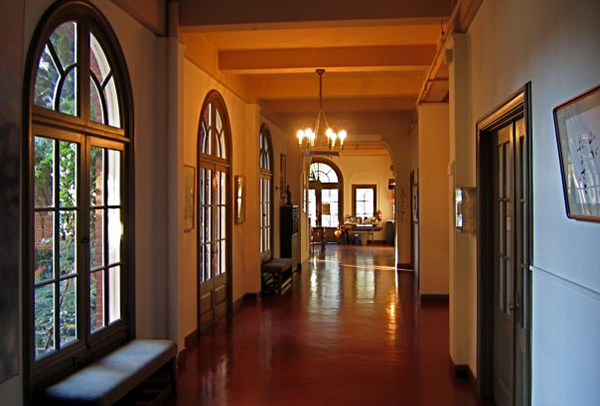
The City Center Mindful Activity Apprenticeship offers a three- to six-month immersion into temple life. Apprentices have the opportunity to practice zazen, engage in ceremonial life, meet with Zen teachers, and connect with a vibrant sangha in the heart of San Francisco. Most importantly, apprenticeships offer an opportunity to study the self in the reflection of each activity. This apprenticeship can be done on its own, or it can be extended into the two-year Work Practice Apprenticeship.
Formal Zen meditation and training is the foundation of community life at City Center and is an integral part of the Mindful Activity Apprenticeship. While other crews practice morning meditation only, the Mindful Activity Apprenticeship schedule allows for both morning and evening meditation throughout the week as well as daily meetings and Dharma discussion with the crew to further explore Zen practice and study.
As part of the Temple Care Crew, apprentices will meet whatever need arises in the community such as washing dishes, mopping floors, dusting, or mending. The Temple Care Crew also tends to ceremonial spaces in the temple including caring for altars and statues.
In essence, the role of the Mindful Activity Apprentice is to polish the temple, abiding by the Zen teaching menmitsu no kafu—taking very good care of things. The daily work practice of the Temple Care Crew emphasizes attention to detail, both internally and externally.
Formal Zen meditation and training is the foundation of community life at City Center and is an integral part of the Mindful Activity Apprenticeship. Apprentices follow the daily temple schedule, which includes sitting meditation, services, and temple cleaning (soji). The Mindful Activity Apprenticeship requires a commitment to the following practice activities:
- Early morning zazen, service, and soji (short Temple cleaning) six days per week
- 31.25 hours of work-practice per week (M–F, 9:00 am–12:30 pm and 1:30–4:15 pm)
- Participation in practice periods and practice period classes
- Regular private meetings with a resident practice leader
- Monthly one-day sittings
- Scheduled sesshins, depending on work and practice assignments
- Saturday morning and Wednesday evening Dharma talks
- Various monthly and yearly ceremonies and events
Additional Information about the Program
Temple work and self-sufficiency are an integral part of Zen training. Moving away from the alms-based tradition, Zen monks were required to roll up their sleeves to support themselves and the temple they lived in. Continuing in this tradition, our Zen training program emphasizes work as practice. Staying aware of somatic experience, we seek to interact gently and harmoniously with one another while caring for the temple. Through caring for the temple, we simultaneously learn to care for ourselves. Apprentices are encouraged to explore their relationship with every activity through the traditional Buddhist practices of generosity, patience, diligence, enthusiasm and awareness.
The curriculum of the apprenticeship includes daily study of Zen texts, and a weekly class. Work practice at San Francisco Zen Center can be best embodied by the famous koan from Layman Pang:
My daily activities are not unusual,
I’m just naturally in harmony with them.
Grasping nothing, discarding nothing.
In every place there’s no hindrance, no conflict.
My supernatural power and marvelous activity:
Chop wood and carry water.
Accessibility and Accommodations
SFZC understands that the demands of the apprenticeship may vary based on each individual's abilities, and we are committed to making reasonable accommodations to support all students. We encourage applicants to communicate their needs upon applying so that a discussion can take place and appropriate accommodations can be arranged. Our goal is to ensure that all students have the opportunity to fully engage with the practice, while honoring their unique capacities.
To Apply |
Health and Safety
City Center is a congregate living facility which includes high risk individuals. We strongly recommend that everyone entering residential life be Covid-vaccinated with boosters. This is not a requirement. New students will be asked to test before coming and three days after arrival.
Diversity, Equity, Inclusion, and Accessibility
At SFZC, we recognize that diversity practice and Dharma practice are deeply interconnected. DEIA work is an essential part of our practice, enabling us to study our own conditioned and discriminating minds, as well as the conditions that give rise to harm, suffering, and collective inequities. Through this work, we deepen our understanding of the causes of suffering and foster greater awareness of how harm occurs. SFZC is committed to engaging in practice, conversation, and study to further embody diversity, inclusion, equity, and cultural humility.
As students of the Dharma, we aspire to view all beings as Buddha, treating everyone with care and respect. City Center welcomes people of every gender, age, race, ethnicity, class/income level, sexual orientation, political belief, language spoken, and physical ability, and we will strive to accommodate the requests of the sangha.
While working on the Temple Care Crew, I learned that making a bed, sweeping and mopping a floor, cleaning a sink, washing bath mats and all the other tasks I performed throughout the day became meditations in and of themselves. And the mind that attended to each task ... was no different from the mind that attended to the breath in the zendo. —Anonymous
Being part of the temple care crew opened great opportunities for experience, both in aspects of work-related and ceremony-related practice. I've learned a lot and I'm grateful to have had that experience! —Naxuan